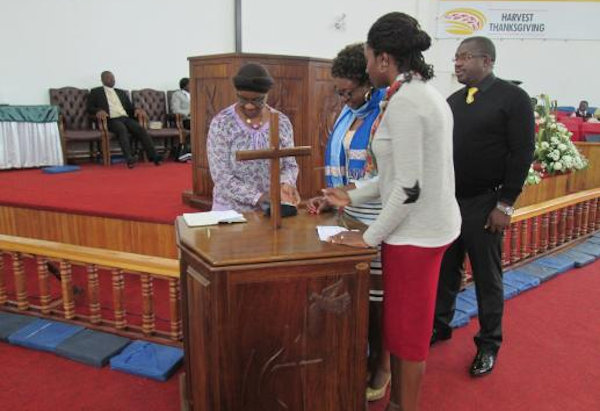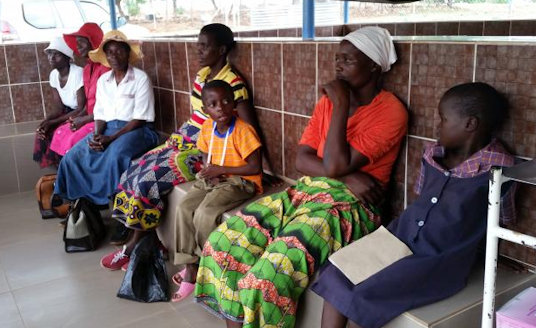Churches, health clinics and schools in Zimbabwe suffer from the civil unrest and uncertainty gripping the nation.
EVELINE CHIKWANAH
United Methodist News Service
Violent, almost daily protests in Zimbabwe against President Robert Mugabe’s handling of the country’s economic crisis have caused some United Methodist churches to cancel some services and even lock their doors and prompted a letter of assurance from Africa University.
Furusa said he recognized “economic realities” might have a negative impact on student enrollment and consequently, the operating budget.
“Whenever there is a mishap within the nation, The United Methodist Church will be affected,” said the Rev. Alan Masimba Gurupira, administrative assistant to Zimbabwe Bishop Eben K. Nhiwatiwa.
Protests and work stoppages were spurred by economic challenges in Zimbabwe that include a lack of jobs, unpaid wages and an unprecedented shortage of cash. Public transport operators also protested against perceived police extortion through roadblocks.
Al Jazeera and other news sources reported the proposed plan to introduce local bank notes that would be used alongside the U.S. dollar has drawn hundreds of protesters outside the finance minister’s office.
Zimbabwe abandoned its own currency in 2009. Mugabe, 92, has held power since 1980 when the country declared independence from Britain.
Churches locked
Some United Methodist churches were closed and locked in July and some planned United Methodist volunteer team mission trips to Zimbabwe have been postponed.
“For the first time ever, congregants who were intending to attend the early morning prayers found the gates of St. Mark United Methodist Church locked,” said the Rev Oswell Kaseke, pastor-in-charge of one of Harare’s biggest churches.
“During the work stoppages, we did not conduct our normal duties. A team of 11 members from Pittsburgh, USA, who were supposed to visit their United Methodist Church counterparts under the Immersion Programme cancelled their visit. They probably feared they would be stranded in the country without access to goods and services,” said Gurupira.
The cancellation of the proposed visit dealt a major blow to the church and the nation, he noted. “The church lost friends who would have assisted us in various areas, while the country lost potential revenue from religious tourism.”
Vulnerable groups who were supposed to benefit from the services availed by pastors also suffered as a result of the protests, Gurupira said.

Churches in urban areas traditionally hold mid-week services on Wednesday evenings, but on July 6, services were suspended as the church feared for the safety of congregants and its properties. Early morning prayers at sanctuaries also were suspended.
“We locked the sanctuary to protect our members and church property because we feared potential rioters would attack us if they found the church operational,” Kaseke said.
He said the atmosphere was tense in the populous Harare suburb of Highfield, where St. Mark is located.
“Highfield was unusually quiet and very few people could be seen on the streets. Our church security personnel were also notably absent as they feared for their lives and did not report for work,” he said.
Chitungwiza-Marondera district lay leader Winston Guyo said choir practice for junior members was suspended and the children advised to remain in the safety of their homes.
“Pastors were unable to conduct home and hospital visits as they feared for their safety,” he said. Clergy members who use public transportation were unable to leave their homes as they were uncertain of getting transport to their destination and back to their homes.
“The parents of infants attending St Philip Pre-School at Kambuzuma United Methodist Church kept their children at home for two days as a precautionary measure to protect them,” said the Rev. Austern Chepiri, Zimbabwe Episcopal Area coordinator.
Chepiri said head office staff who use public transport failed to find buses to get to their workplace and had no option but to stay at home.
Spiritoso Chorale, a gospel music group, had planned to hold a concert on July 9 but postponed the event. The 72-member outfit is comprised of 10 United Methodists and other members from different churches.
The group said they were unable to get the compulsory police clearance for such an event in the light of uncertainty, which gripped the nation.
“This is due to some violence threats which are in circulation hence the authorities suggested the postponement of the concert. It is extremely important that laws and regulations regarding permits be strictly adhered to so that safety can be ensured,” the chorale’s statement said.
Concerns for health clinics, hospitals
Speaking during a one-day workshop held in Harare on June 21, Grace Musuka, United Methodist regional missionary, said there is need for a concerted effort by all members to raise funds for the three health institutions — Nyadire, Mutambara and Old Mutare mission hospitals.
“As a result of the non-performing economy, the government is facing challenges in stocking enough drugs, availing transport, hospital equipment and shortage of manpower among other things,” she explained.
At a recent meeting of The Nyadire Connection, a group from Pittsburgh that supports the Nyadire Mission, Vivid Gwede of Zimbabwe updated the group on the current situation and future possibilities for the African nation.
“The extended drought and shortage of cash have created significant hardships throughout Zimbabwe,” he reported. “Salary payments were delayed in June and probably will be again delayed in July. Imports of many items were briefly banned, creating a chaotic situation at border crossings. Banks are limiting the amount of funds that can be withdrawn.”
The Youth “Zim Camp,” a partnership between Western Pennsylvania and Zimbabwe, was canceled due to uncertainty over protests within Zimbabwe.
Last Updated on December 8, 2023

